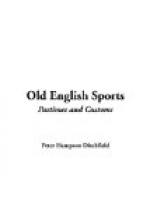The observance of Hock-tide seems to have been particularly popular in the ancient town of Reading. At Coventry there was an “old Coventry Play of Hock Tuesday,” which was performed with great delight before Queen Elizabeth at Kenilworth: the players divided themselves into two companies to represent the Saxons and the Danes: a great battle ensued, and by the help of the Saxon women the former were victorious, and led the Danes captive. The queen laughed much at the pageant, and gave the performers two bucks and five marks in money.
So ends the month of sunshine and of shower; but the rustic youths are making ready for the morris-dance, and the merry milk-maids are preparing their ribbons to adorn themselves for the revels of May Day. The May-pole is being erected on the village green, and all is in readiness for the rejoicings of to-morrow.
CHAPTER V.
MAY.
“Colin met Sylvia on
the green
Once on the charming
first of May,
And shepherds ne’er
tell false, I ween,
Yet ’twas
by chance, the shepherds say.
“Colin he bow’d
and blush’d, then said,
’Will you,
sweet maid, this first of May,
Begin the dance by Colin led,
To make this quite
his holiday?’
“Sylvia replied, ’I
ne’er from home
Yet ventur’d,
till this first of May;
It is not fit for maids to
roam,
And make a shepherd’s
holiday.’
“‘It is most fit,’
replied the youth,
’That Sylvia
should this first of May
By me be taught that love
and truth
Can make of life
a holiday.’”—LADY CRAVEN.
May Day Festivities—May-pole—Morris-dancers—The
Book of
Sports—Bowling—Beating
the Bounds—George Herbert’s
description of a Country Parson.
The spring has dawned with all its brightness and beauty; the nightingale’s song is heard, and all nature seems to rejoice in the sweet spring-time. Our forefathers delighted, too, in the advent of the bright month of May, which the old poets used to compare to a maiden clothed in sunshine dancing to the music of birds and brooks; and May Day was the great rural festival of the year.
Long before the break of day, men and women, old and young, of all classes, used to assemble and hurry away to the woods and groves to gather the blooming hawthorn and spring flowers, and laden with their spoils returned when the sun rose, with merry shouts and horn-blowings, and adorned every door and window in the village. The poet Herrick sings of this pleasant beginning to the day’s festivities. Addressing a maiden named Corinna, he says—




